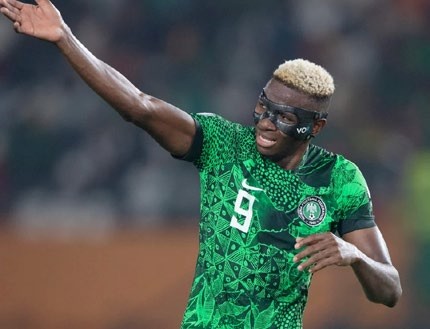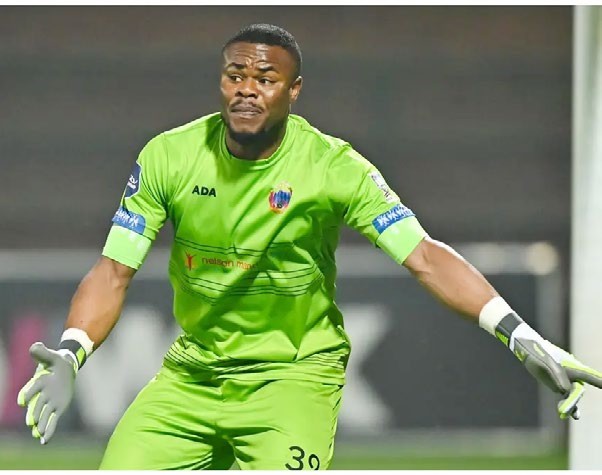February 04, (THEWILL) – The Africa Cup of Nations has witnessed the Super Eagles of Nigeria embark on a thrilling journey, marked by resilience and determination, leading them to the semi-finals with their eyes fixed firmly on the prestigious trophy. From a rocky start in the group stages to a commanding presence in the knockout rounds, the Super Eagles have displayed a remarkable transformation, with key players stepping up to ensure their success.
In Group A, the Super Eagles faced Equatorial Guinea, Ivory Coast, and Guinea, encountering a challenging start to their campaign. Despite a draw against Equatorial Guinea, the team claimed a hard-fought 2-0 triumph over hosts Ivory Coast and another narrow 1-0 win over Guinea-Bissau. Finishing second in the group behind Equatorial Guinea due to goal difference, the Super Eagles showed glimpses of their potential, but left fans eagerly anticipating an upward surge in performance as they progressed.
The turning point came in the Round of 16 clash against football powerhouse Cameroon. The Super Eagles, led by the stellar performance of Ademola Lookman and the tireless energy of Victor Osimhen, earned a convincing 2-0 victory. Lookman’s double marked a shift in momentum and ignited hopes for a successful journey through the knockout stages.


Facing Angola in the quarter-finals, the Super Eagles demonstrated their growth and determination. Despite Angola’s commendable performance in the tournament, Nigeria secured a 1-0 victory with Lookman once again proving instrumental. The 41st-minute strike from Lookman sealed their place in the semi-finals, solidifying their credentials as serious title contenders.
The success of the Super Eagles in the tournament can be attributed to the stellar performances of key players who have consistently delivered when it mattered most. Calvin Bassey and Ola Aina formed an impenetrable defensive pair, in a defensive formation that has conceded only one goal in four matches. Their standout displays against Cote d’Ivoire particularly highlighted their defensive prowess.
Goalkeeper Stanley Nwabili, who is making his tournament debut and the only player in the starting XI playing club football on the continent, emerged as a crucial figure, making breathtaking saves that kept the Super Eagles in contention throughout the tournament. William Troost-Ekong, the team’s captain, exemplified leadership skills while anchoring the defence alongside Bassey and Aina. Ademola Lookman, also in his AFCON debut since making the international switch from England to Nigeria, became a talisman for the Super Eagles, scoring crucial goals in key encounters.

With a spot in the semi-finals secured, the Super Eagles are now shifting their focus to the ultimate prize – the AFCON trophy. Their journey thus far has been marked by adaptability, learning, and a commendable rise to the occasion. The transformation from the group stages to the knockout rounds has been nothing short of remarkable, instilling confidence that the Super Eagles might be on the brink of lifting the coveted trophy for what has so far been an elusive 4th time.
Their journey to the semi-finals stands as a testament to their resilience, adaptability, and growing confidence. With key players consistently delivering outstanding performances and a nearly impregnable defence, the Super Eagles have every reason to believe that AFCON glory is well within their grasp. The football crazy fan base back home eagerly awaits to witness the Super Eagles soar to new heights and etch their names in African football history, especially Osimhen, the reigning CAF Best Footballer.

Indeed, the 34th edition of the Africa Cup of Nations has proven to be a spectacle of surprises and gripping performances. The tournament has captivated football enthusiasts with unexpected twists and standout player achievements.In a surprising turn of events, the leading forces of African football – Morocco, Senegal, Egypt, Tunisia, and Algeria – all faced untimely exits.
Morocco suffered an unexpected blow in the round of 16, succumbing to a 2-0 defeat against South Africa, a loss that shook the tournament dynamics. Defending champions Senegal experienced a similar heartbreak, drawing 1-1 with Ivory Coast but ultimately losing 5-4 in a penalty shootout, ending their title defence aspirations.
Egypt, another football heavyweight, shared Senegal’s fate, exiting in the round of 16 after a 1-1 draw against DR Congo, losing 8-7 in a dramatic penalty shootout. Tunisia’s journey took an unforeseen turn as they bowed out in the group phase, finishing 4th in Group E and failing to secure a spot in the knockout stage. Algeria, the 2019 champions, faced another wave of disappointment as they did in 2022, finishing 4th in Group D and failing to progress past the group phase.
The mass exit of these top-ranked teams sent shockwaves through the football community, challenging pre-tournament predictions and emphasising the unpredictable nature of the sport. On the flip side, one of the most astonishing developments has been the rise of Cape Verde, a team that has defied expectations to reach the quarter-finals. Their journey has overshadowed the likes of South Africa, who, despite a stunning victory over favourites Morocco, found themselves outshone by the underdog success story of Cape Verde.
In terms of statistics, the tournament has witnessed a total of 106 goals in 45 matches, averaging 2.36 goals per match. Emilio Nsue has emerged as the leading scorer with an impressive tally of 5 goals, a demonstration of his clinical quality in front of goal. This statistic reflects the intense competition and offensive capacities displayed by participating teams.
Some matches have been particularly thrilling, leaving fans on the edge of their seats. The clash between Egypt and Mozambique ended in a captivating 2-2 draw, highlighting the competitive nature of what used to pass as weak teams and minnows of African football. Additionally, Cape Verde’s commanding 3-0 victory over Mozambique demonstrated their determination and ability to dominate on the grand stage.
As the tournament progresses, it continues to serve as a platform for showcasing the immense talent within African football. Beyond the competition, it has become a source of national pride for the participating countries, fostering a sense of unity and celebration of sporting achievement.
Nigeria, alongside Cape Verde, have been standout performers, with Moses Simon’s stellar contributions exemplifying the Super Eagles’ determination to clinch the title. The echoes of their triumphs reverberate not only within the borders of the nations they represent but resonate globally, drawing attention to the prowess of African football.

The anticipation among fans worldwide is palpable as they eagerly await more thrilling matches and standout performances in the remaining stages of the AFCON 2023. The tournament’s ability to consistently deliver unexpected outcomes and unforgettable moments solidifies its status as a premier event in the African football calendar.
Even at this stage, the Africa Cup of Nations has proven to be a rollercoaster of emotions, blending the ecstasy of victories with the agony of defeats. The overall competitive spirit on display that has elevated lesser ranked teams beyond the exits of the highest ranked sides in Africa make this edition a memorable chapter in the rich history of football on the continent. As the drama unfolds on the pitch, the world watches with bated breath, ready to witness the crowning of an unpredictable champion and the culmination of yet another thrilling AFCON tournament.
About the Author
Jude Obafemi is a versatile senior Correspondent at THEWILL Newspapers, excelling in sourcing, researching, and delivering sports news stories for both print and digital publications.




